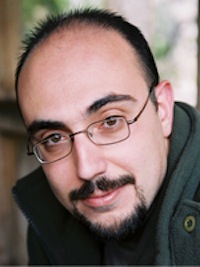Resistance in the ghettoes: New explanation focuses on history, political experience
What drives some people to succumb to oppression while others fight back? Is it culture, willpower, luck or experience? In a new study of Jewish resistance to Nazi genocide in Poland and the Soviet Union, Evgeny Finkel roots the answer in experience.

Finkel
Finkel, who just received a Ph.D. in political science at the University of Wisconsin–Madison, studied ghettoes built by the Nazis to hold Jews during World War II. The cataclysm started 73 years ago, when Germany invaded Poland on Sept. 1, 1939.
On Sept. 17, the Soviet Union invaded from the east, and for two years, Polish Jews were oppressed by two tyrannies that had almost opposite effects, Finkel says.
Then, on June 22, 1941, Germany erased the division as it invaded the rest of Poland, drove to the gates of Moscow, set up 1,126 ghettoes, and ramped up its systematic murder of the Jews.
Until 1939, Jews had lived under essentially the same conditions across Poland. So why, starting in 1941, did 23 of the 27 rebellions in Polish Jewish ghettos occur in the eastern sector? The answer was rooted in the two-year Soviet occupation, Finkel says, and specifically the clandestine political activity of passionate young Jews who belonged to Zionist and socialist parties.
In western Poland, occupied by Germany from 1939 to 1941, Finkel says Jews were persecuted as Jews, but the Nazis did little to suppress Jewish political activity. The situation was the opposite under the Soviets in the east, he adds. “Jews had it relatively good” in eastern Poland, unless they engaged in political activity outside the communist party, he says.
In those circumstances, Jews in eastern Poland learned the tradecraft of underground organization — smuggling, clandestine publishing and sustaining secret networks.
And that experience, in brief, explains why among the Polish ghettoes, “at least 80 percent of the ghetto resistance occurred in eastern Poland,” Finkel says, “even though it was the same national, religious group as in western Poland.”
When choosing his Ph.D. project, Finkel reasoned that the Holocaust would be “an important case of a more general question of how people behave in extreme situations.”
“These were mainly young idealists, socialists who wanted to preserve their culture. … This was their first experience working underground, so when the Germans came, they knew how to do it.”
Evgeny Finkel
After reading and viewing hundreds of testimonies of Holocaust survivors, Finkel credited experience under the Soviet occupation for teaching survival skills. “The communists banned all political parties, and some Zionist groups went underground — not to fight the Soviet Union, but to preserve their organization. These were mainly young idealists, socialists who wanted to preserve their culture. They were publishing underground leaflets, and even if they praised the Soviet Union, they could very easily be sent to a prison camp in Siberia for this. This was their first experience working underground, so when the Germans came, they knew how to do it.”
Conditions in western Poland between 1939 and 1941 were not conducive to learning these skills, Finkel says. “The Jews did not know what to expect from the Germans, but they knew that if they resisted, the Germans were likely to use collective punishment and hundreds could be killed, so it did not make sense to resist.”
In 1942, the genocide happened too fast for the Jews in western Poland, Finkel says. “Some of them started organizing, but they did not have the skills. It was too late to learn them, and they were killed almost immediately.”
Poland provided a perfect test to explore why some people resisted and others did not, Finkel says. “Beside this two-year period, the Jews in Poland had the same culture, experience and organizations. They lived in the same state.”
The Zionist and socialist Jews in Poland “thought in terms of how they would go down in history; they wanted to show that Jews could resist.”
But the “training” achieved under the Soviets made all the difference, Finkel says. “Support for a Zionist political party was the strongest predictor of a ghetto uprising; the two-year Soviet occupation was crucial for the formation of the Jewish underground.”
“The Holocaust was part of my family history, it was not something I just learned about in school.”
Evgeny Finkel
Finkel was born in the Soviet Union and grew up in Israel. In August, he started work as an assistant professor at George Washington University.
“The Holocaust was part of my family history, it was not something I just learned about in school,” he says.
What was it like to spend years studying the testimonies of survivors? “I can’t say it did not affect me at all. I’m Israeli, I was saturated with this, and I thought nothing could surprise me, but I was wrong.”
Finkel also had the linguistic skills, speaking Russian, Polish, English and Hebrew, to understand the archival and testimonial material. “There are not that many political scientists who have this linguistic background to deal with this material,” he says. “I knew if I did not do this, no one would.”




